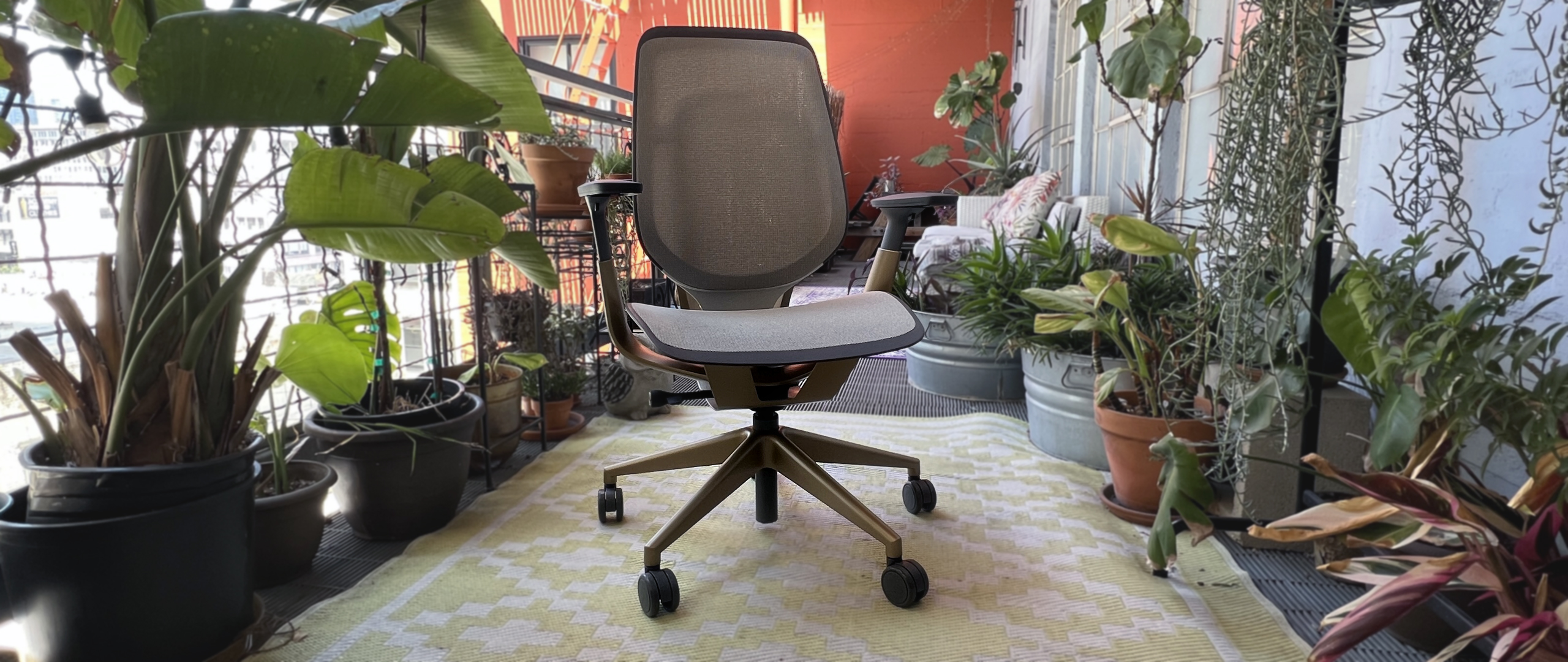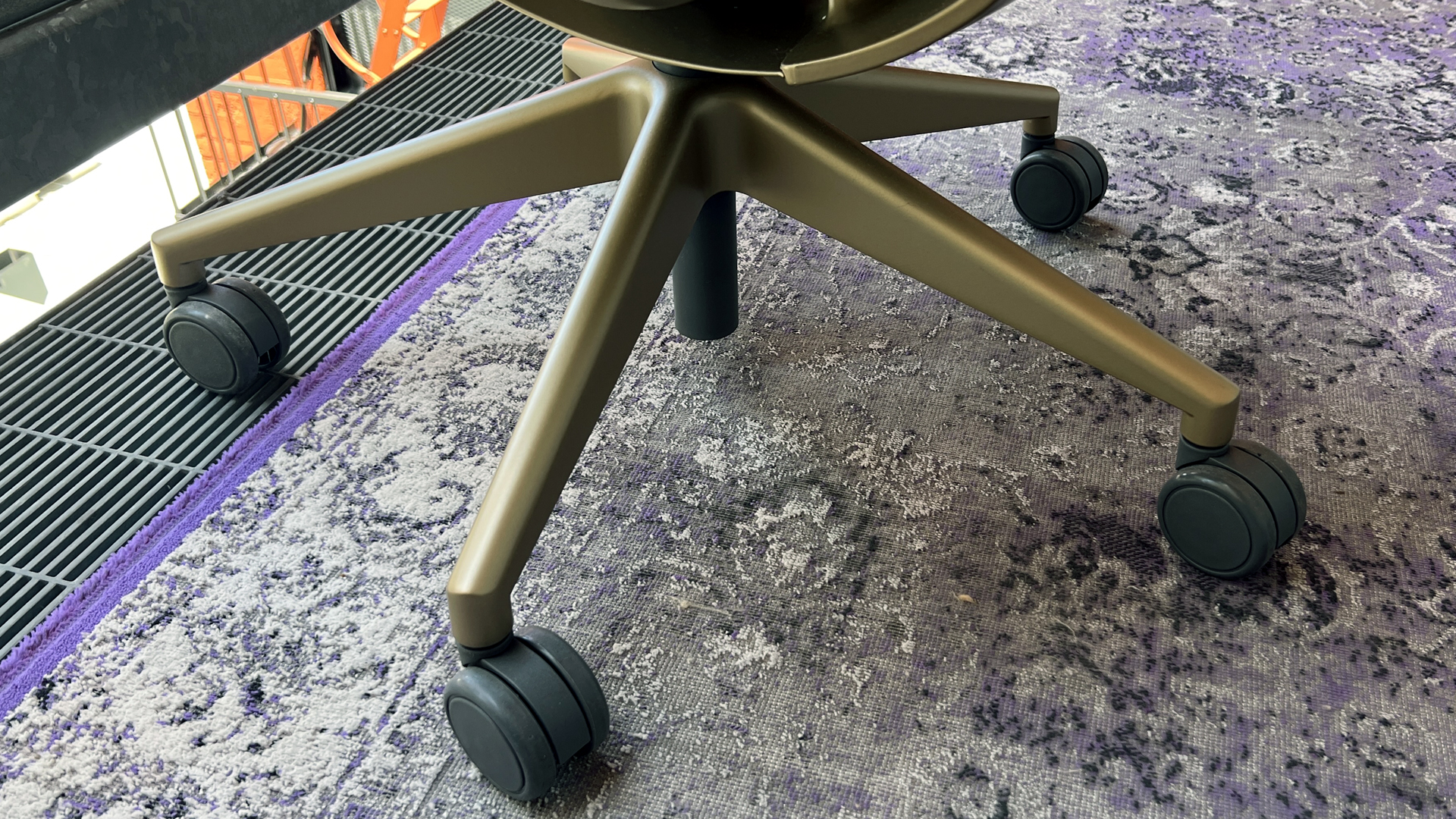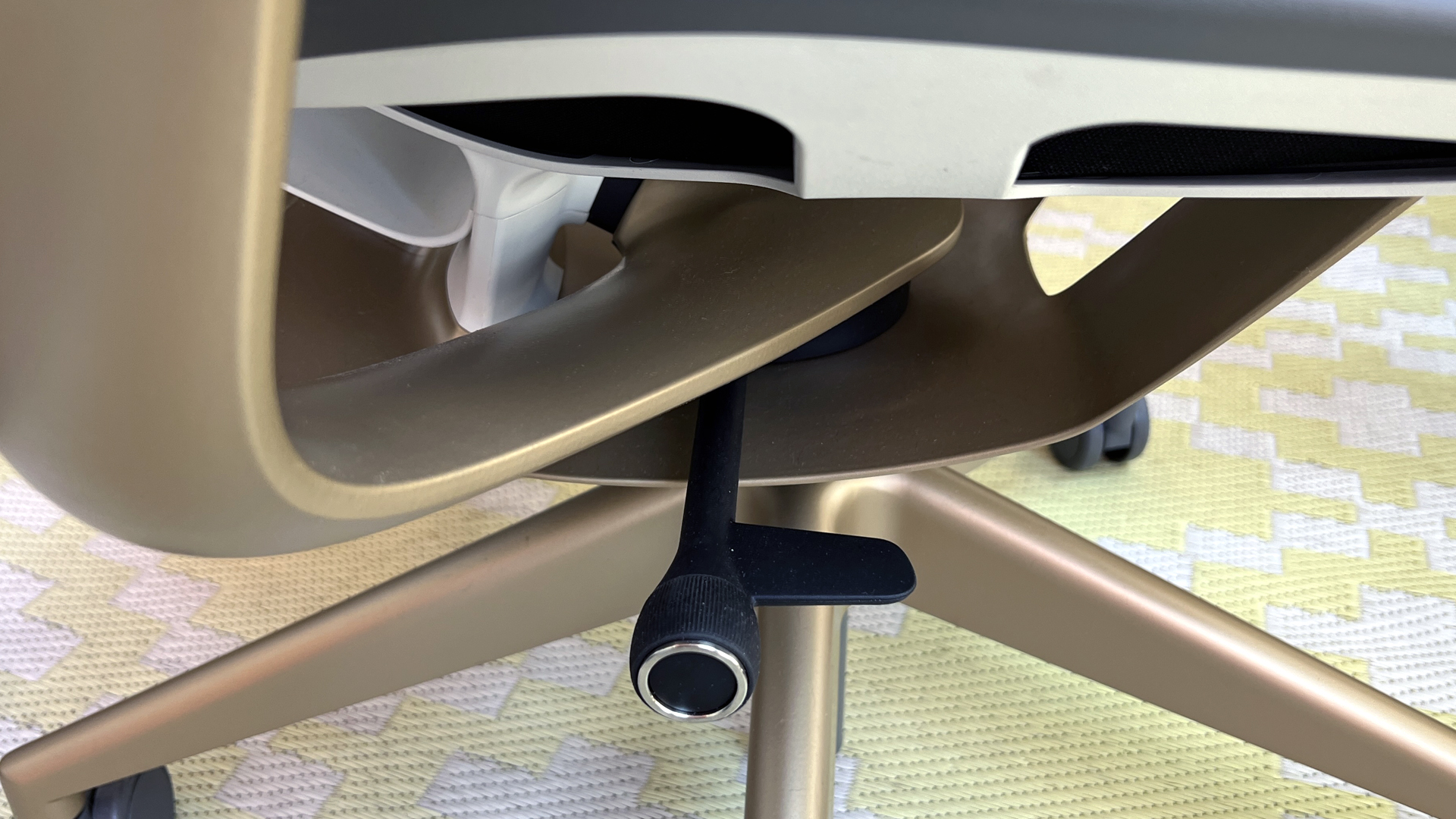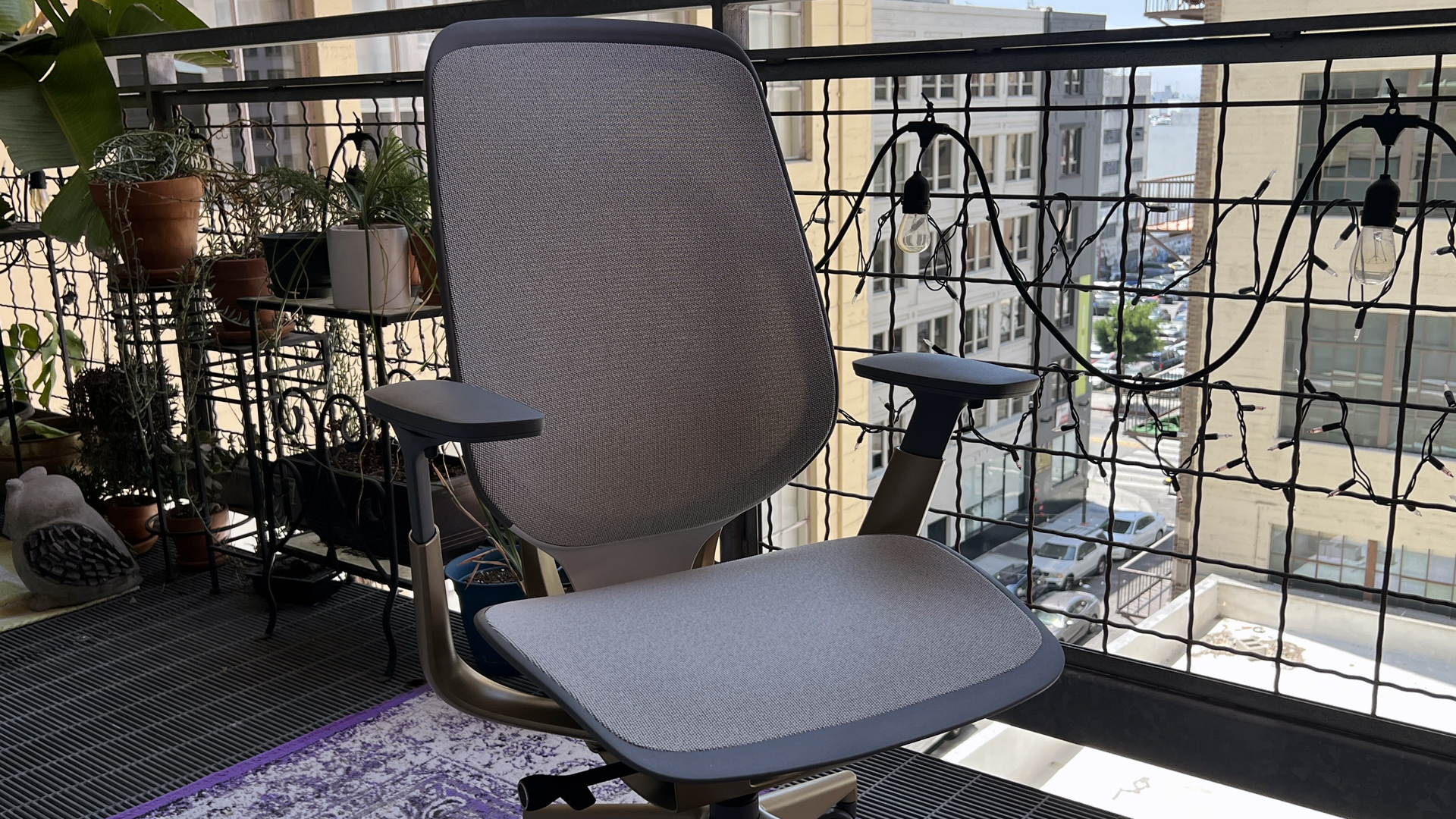Tom's Hardware Verdict
The Karman is an extremely comfortable mesh task chair with weight-activated support that adapts to your posture. It's perfect for long hours at your PC (whether you're gaming or working), but it's not cheap.
Pros
- +
Comfortable, with weight-activated frame that moves to adjust support as you move
- +
Extremely lightweight (29lbs) and ships fully assembled
- +
Fits multiple people without need for adjustments
Cons
- -
Expensive
- -
Doesn’t really recline
- -
Limited adjustments and only comes in one size
Why you can trust Tom's Hardware
The best gaming chair is not necessarily a gaming chair — an aggressive, racing-style gaming chair may make you feel like you're sitting in the driver's seat of a luxury supercar, but it gets old pretty quickly when you're actually sitting in front of your PC for hours at a time. The best chair for sitting in front of your PC is usually — surprise, surprise — a chair designed for exactly that.
In other words: a task chair.
Like Steelcase's lightweight, all-mesh Karman, which comes in a variety of colorways and customizations and features an ultra-comfortable weight-activated design that moves with your body and adjusts support in real-time. The Karman is an ergonomically-designed task chair that makes sitting at your desk for hours feel fantastic (whether you're gaming, working, or doing something else), but it doesn't come cheap — even the cheapest variation is still pricier than most standard racing-style gaming chairs. The Karman starts at $846 for an armless version; our review unit as configured will set you back $1,247, and the priciest configuration — which includes additional lumbar support and carbon neutral certification — is $1,598.
Assembling the Karman
The Karman ships fully assembled.
Design of the Karman
The Karman is an all-mesh task chair with a flexible, lightweight frame and an aluminum base. It’s made with SteelCase’s proprietary “Intermix” mesh (excuse me — “beyond mesh”) fabric, which comes in translucent, opaque, and color-shifting options. The upholstery colorways include black, dark blue (“Baltic”), dark red (“Merlot”), seafoam green (“Peacock”), light gray/cream (“Seagull”), and dark brown (“Bronze”), as well as a dual-tone red-blue (“Red-Blue”). Our review unit came in the opaque “Seagull” color, which is softer and more fabric-like than most chair mesh, and had a cream and light gray frame and a matte gold (called “matte brass”) base.
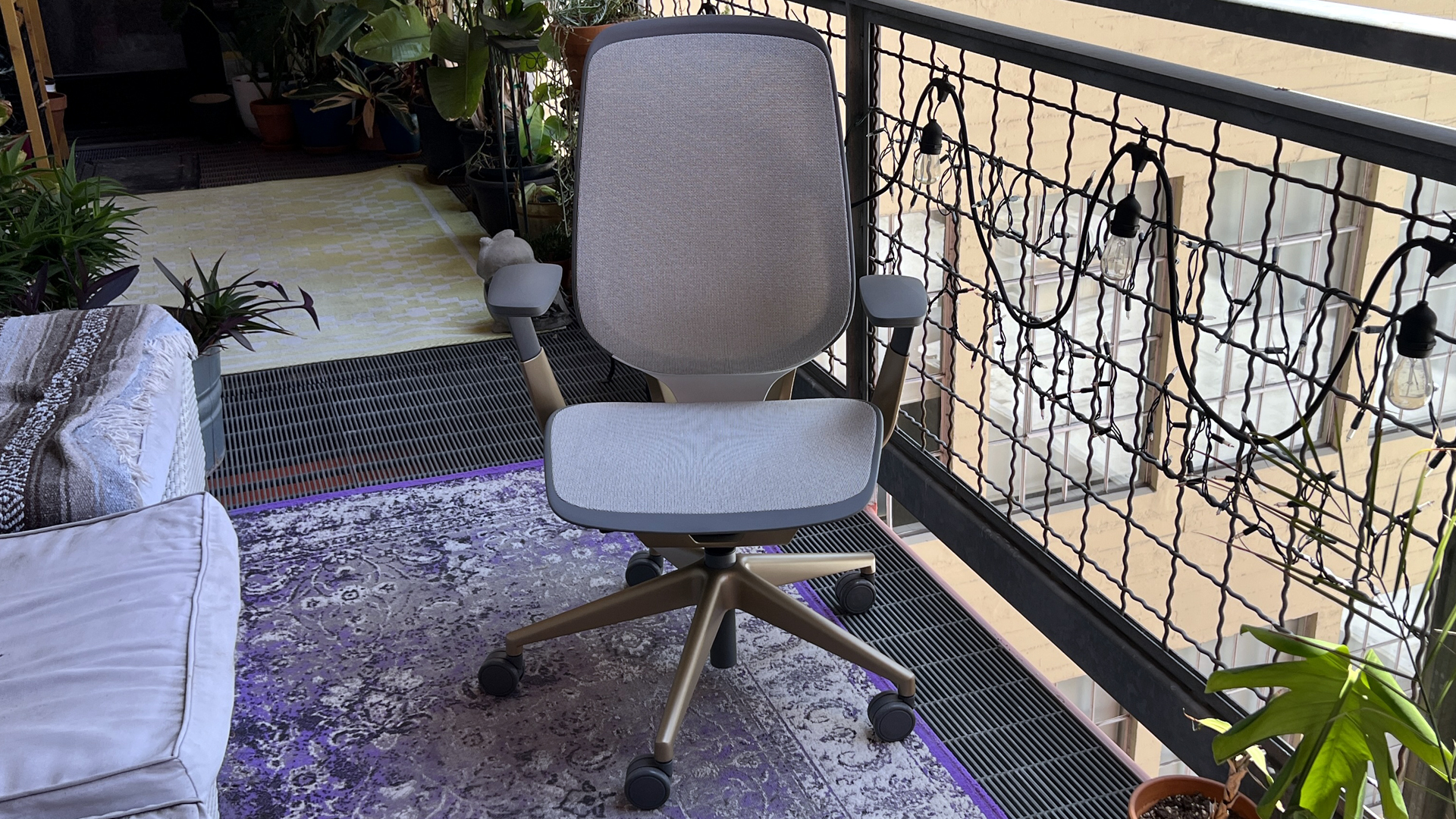
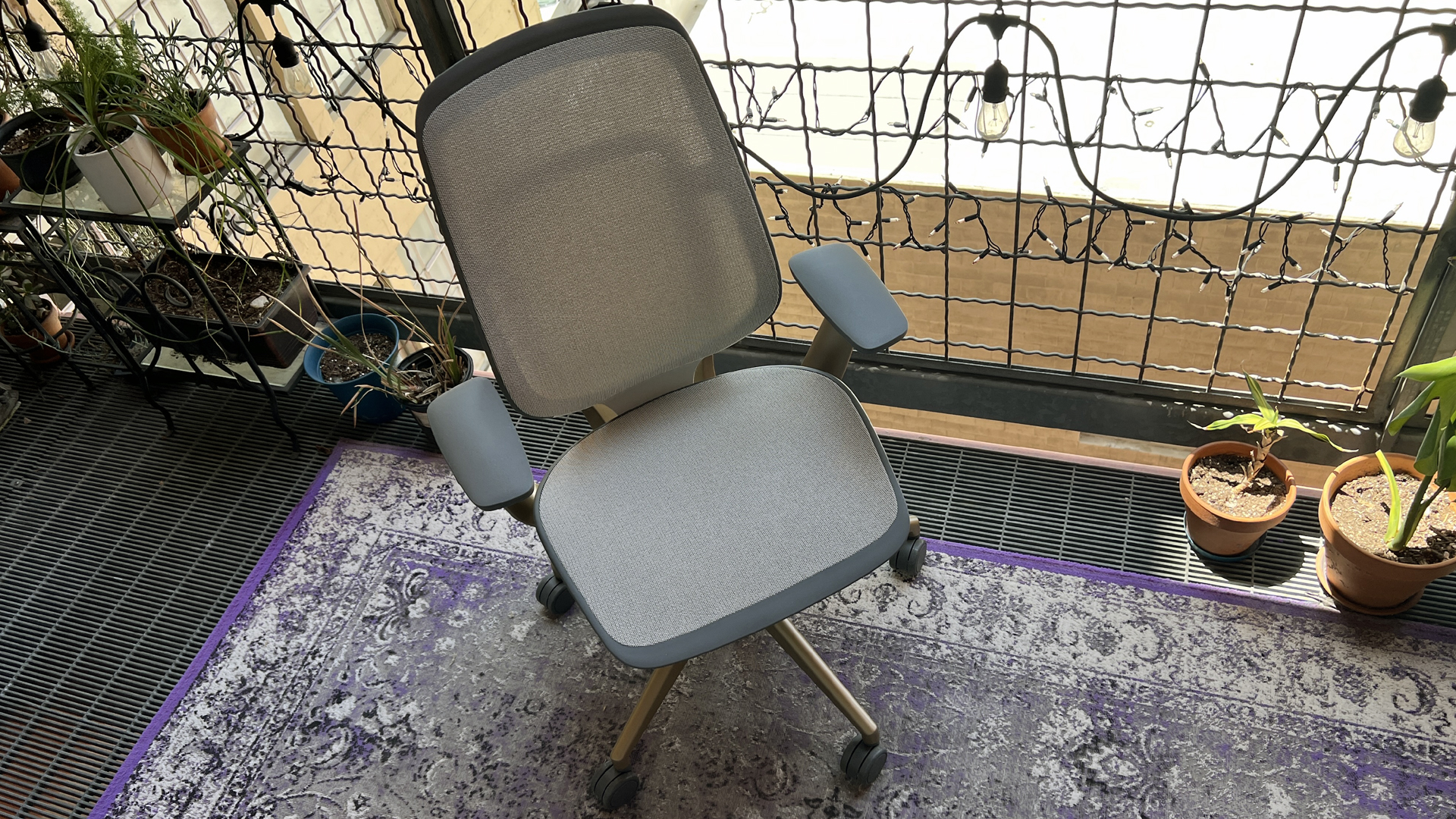
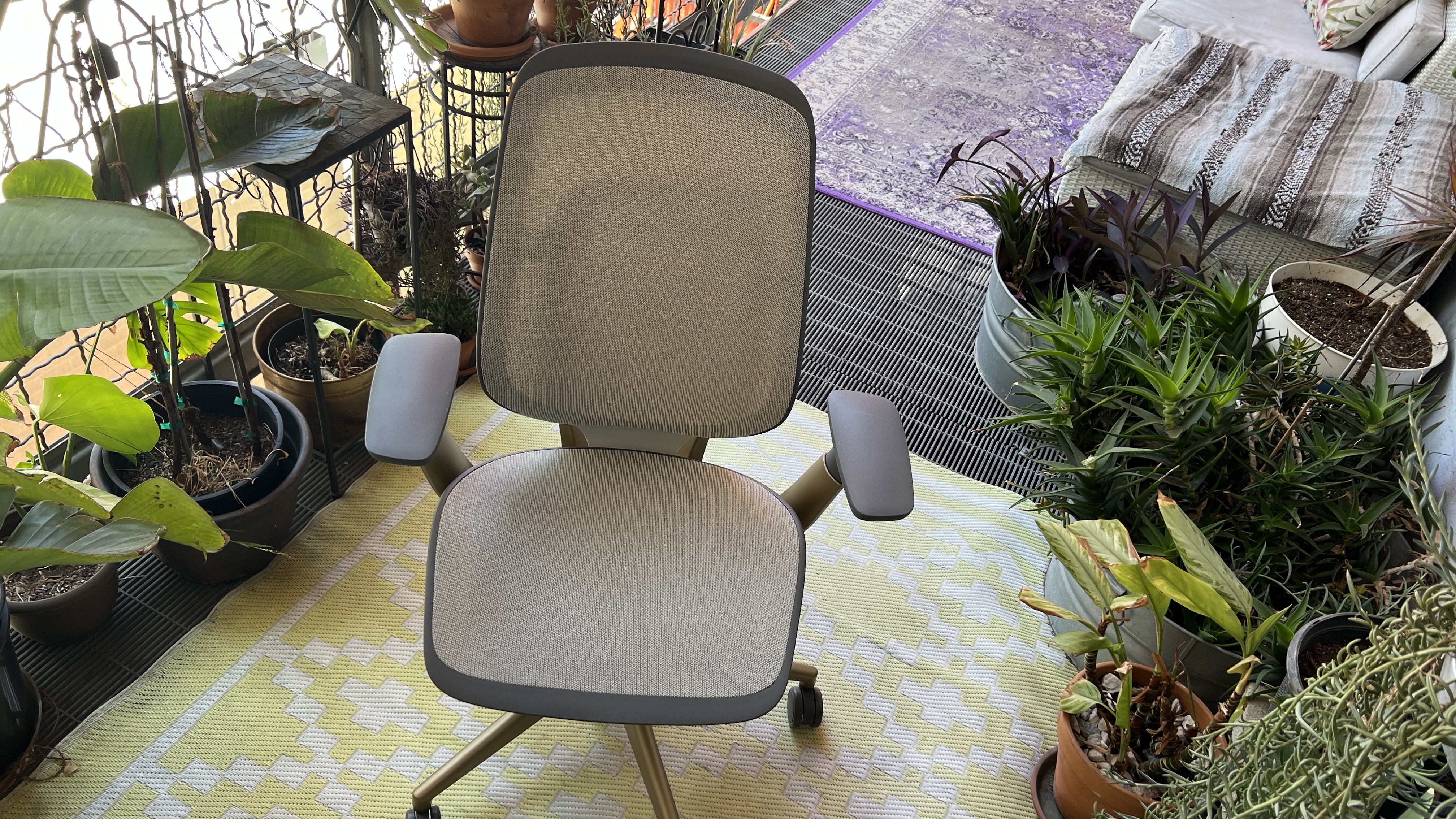
The Karman is very much a task chair, especially in this colorway. It’s smaller and lighter than racing-style gaming chairs, but is similar in size and weight to the Herman Miller x Logitech G Vantum. The Karman is 44.25 inches (112.4cm) tall (maximum height, base to top of backrest), which is the same height as the Vantum (not including headrest). At its widest point, the backrest measures just under 17.5 inches (44.5cm) wide, but at shoulder level it’s closer to 15 inches (38cm).
This shouldn't present an issue for most people, however, because it's not a racing-style chair with wings that curve forward. My shoulders are about 15.5 inches wide, and the Karman's backrest fit me perfectly; my husband's shoulders are larger (about 21.5 inches wide), and he also had no issue with the Karman's shoulder support.
Get Tom's Hardware's best news and in-depth reviews, straight to your inbox.
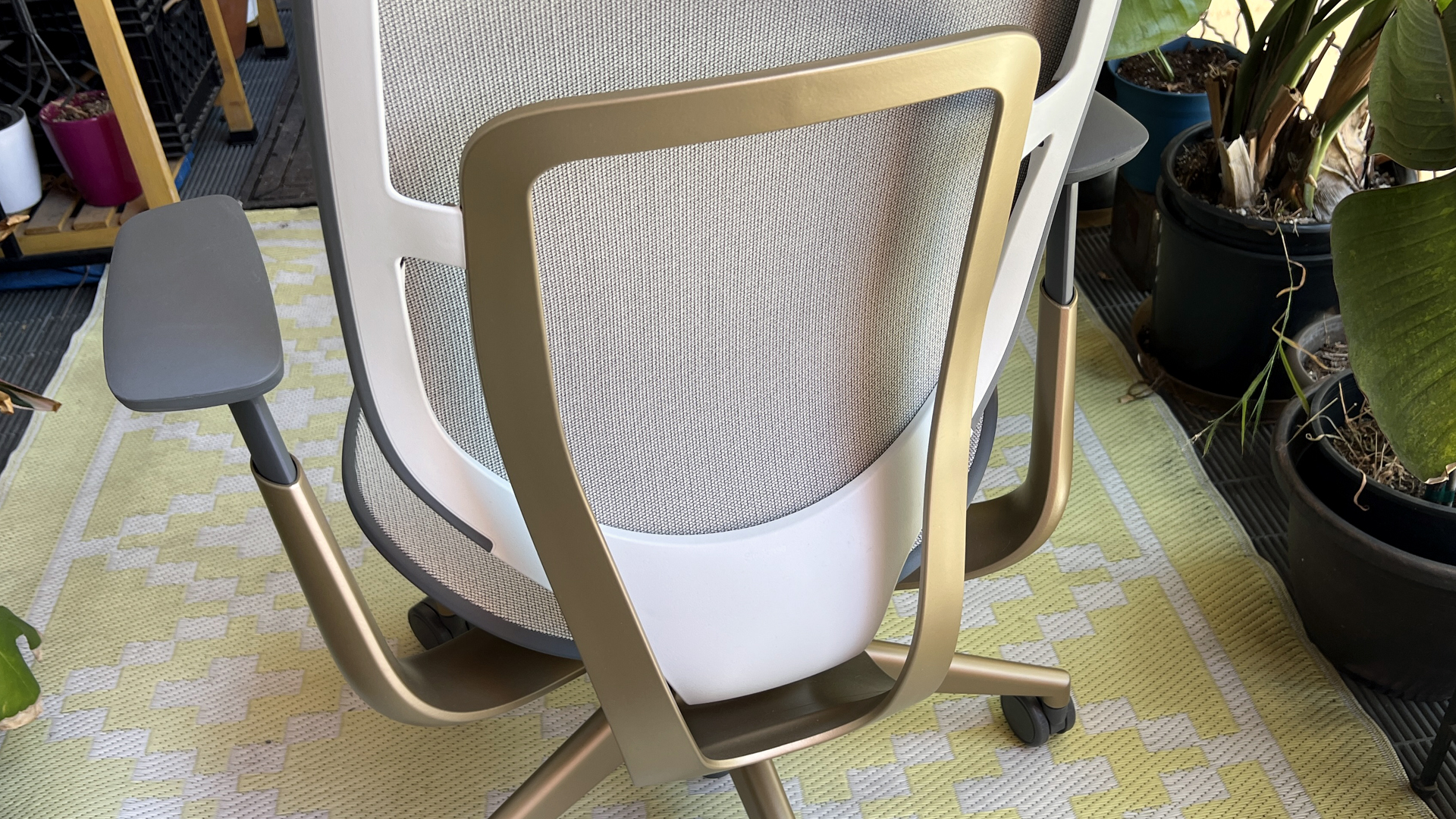
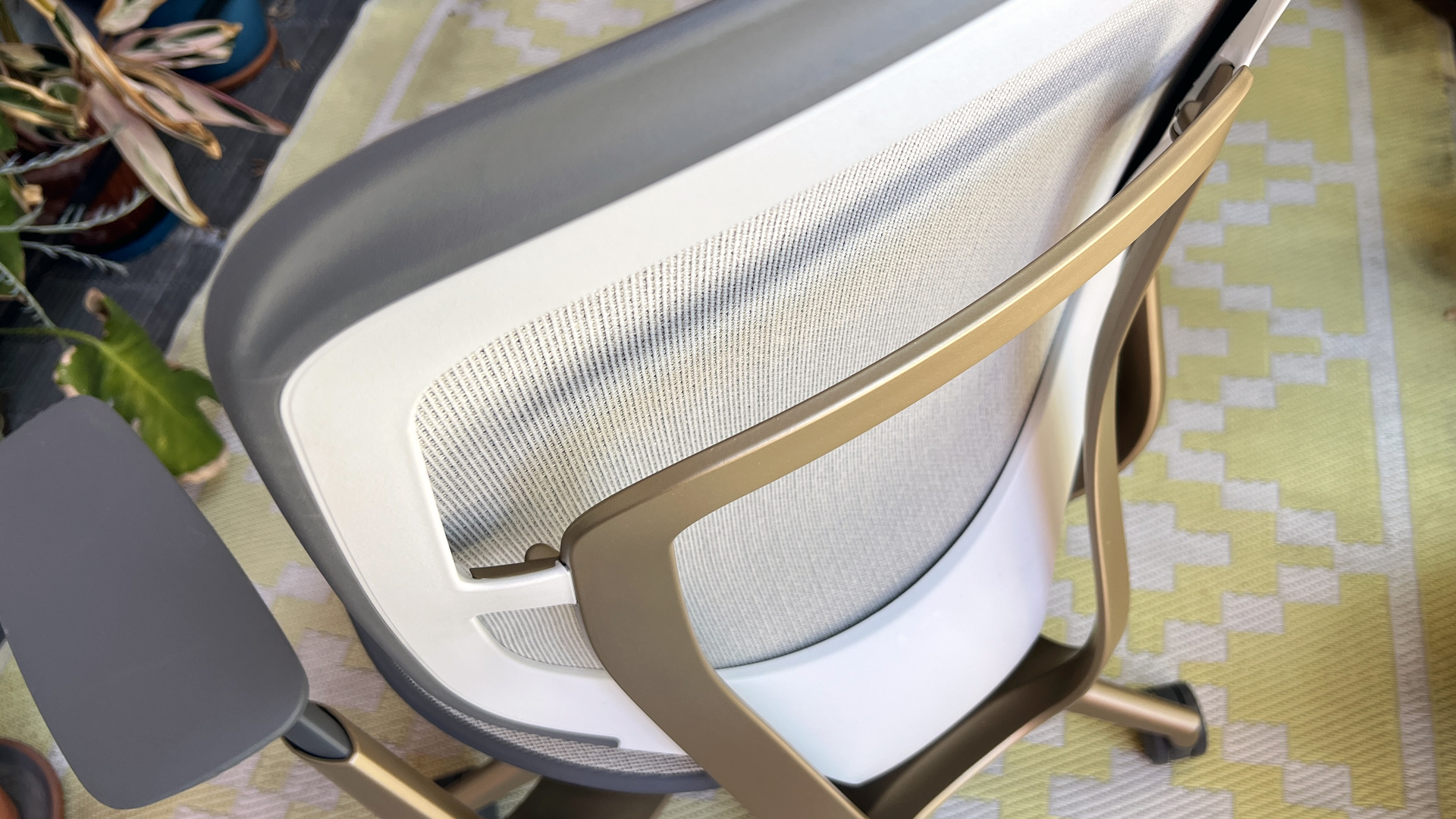
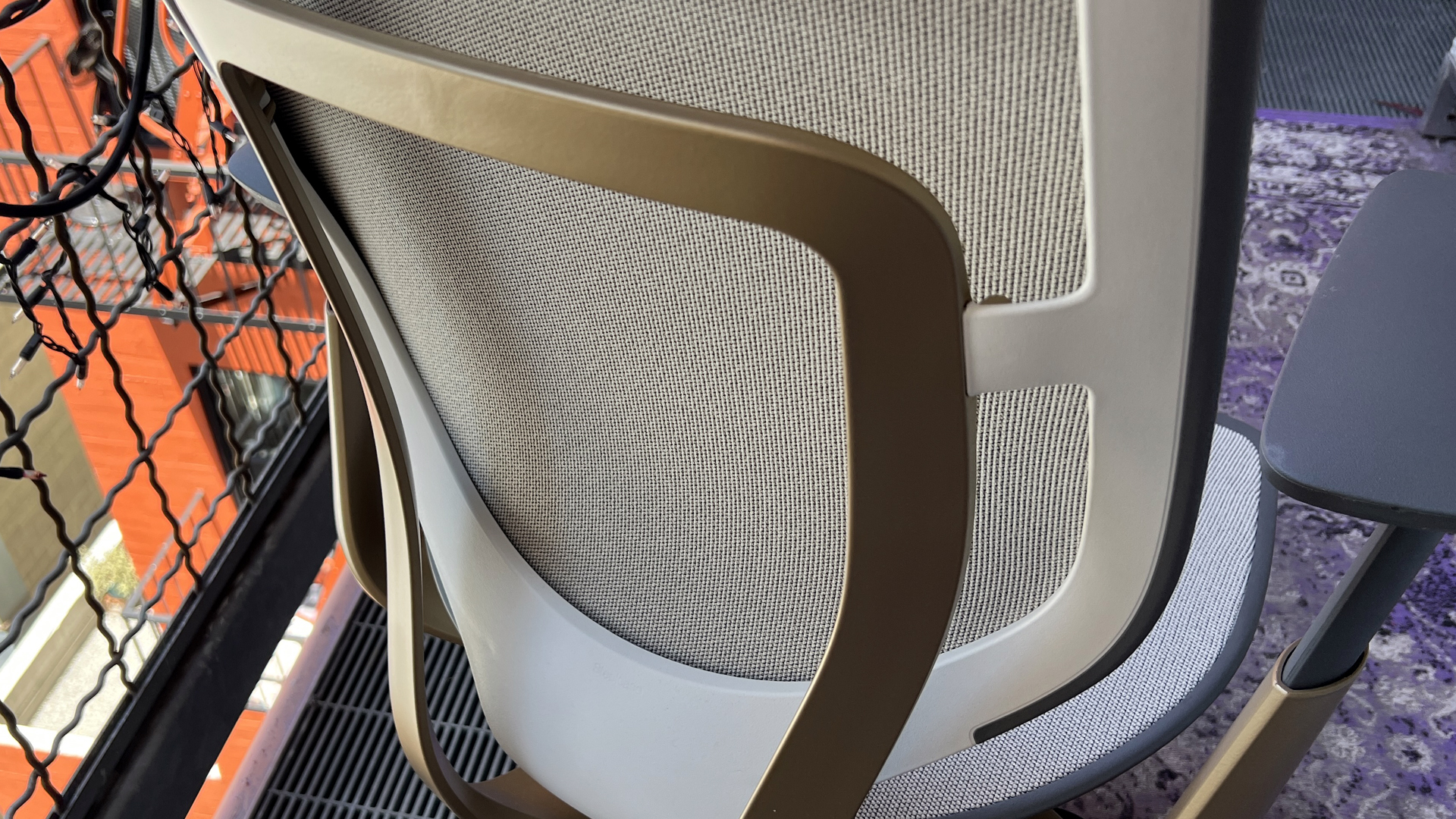
The Karman's slim, lightweight frame and its range of color and upholstery options make it more attractive than most all-mesh task chairs, which tend to be more utilitarian in both style and color (see: the Herman Miller Aeron — my all-time favorite chair and my daily driver when I'm not chair-testing, but it's not exactly beautiful, nor does it fit with most people's home decor).
The Karman has a two-part back frame that, combined with the chair's Intermix mesh, is designed to move with your body weight and offer responsive, "personalized" back and spine support. It does a good job of supporting your back and shoulders and the fabric was taut enough for my lumbar region, but if you think you might need more than just mesh, the company offers a sliding lumbar support add-on for an extra $57.
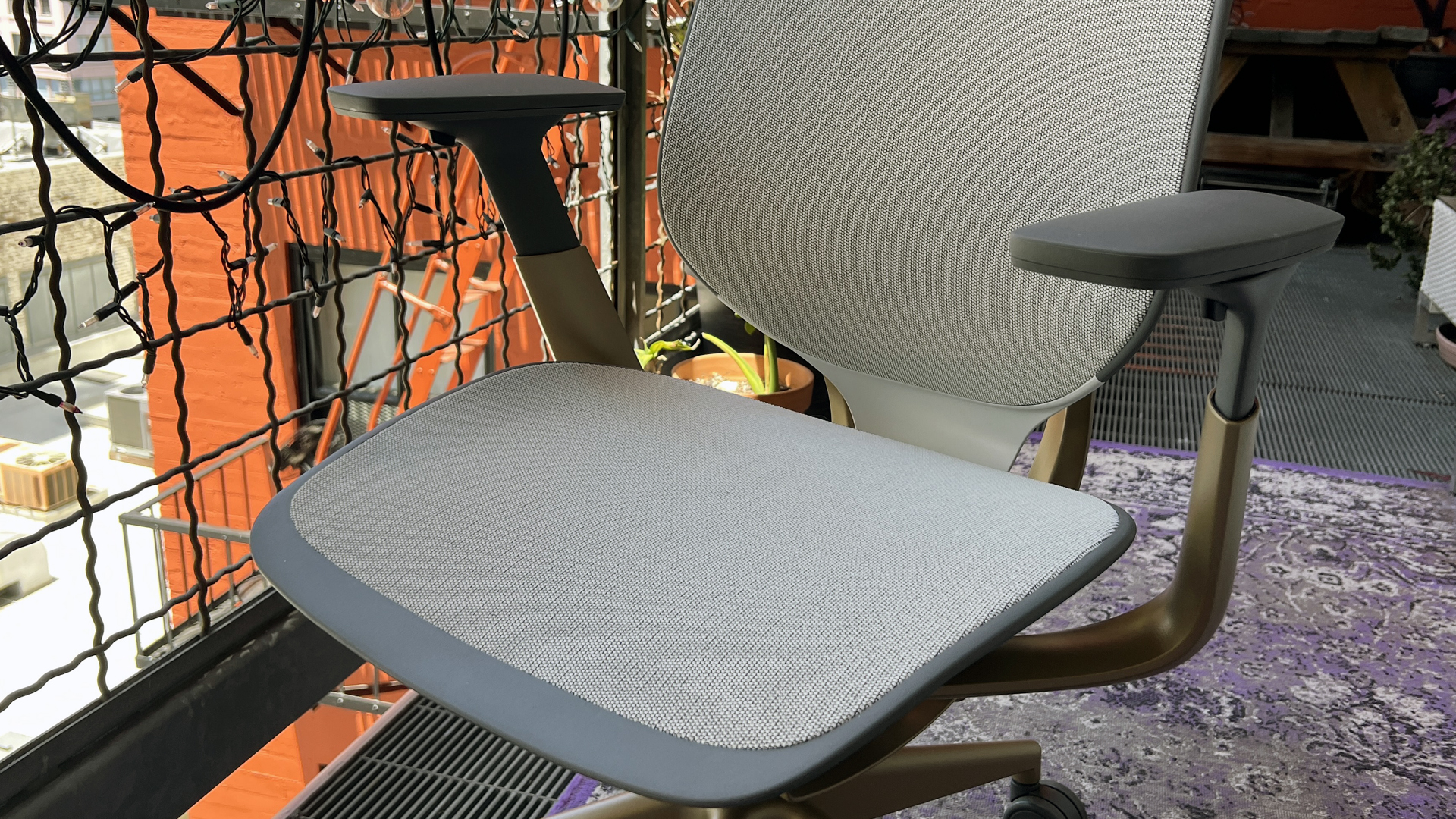
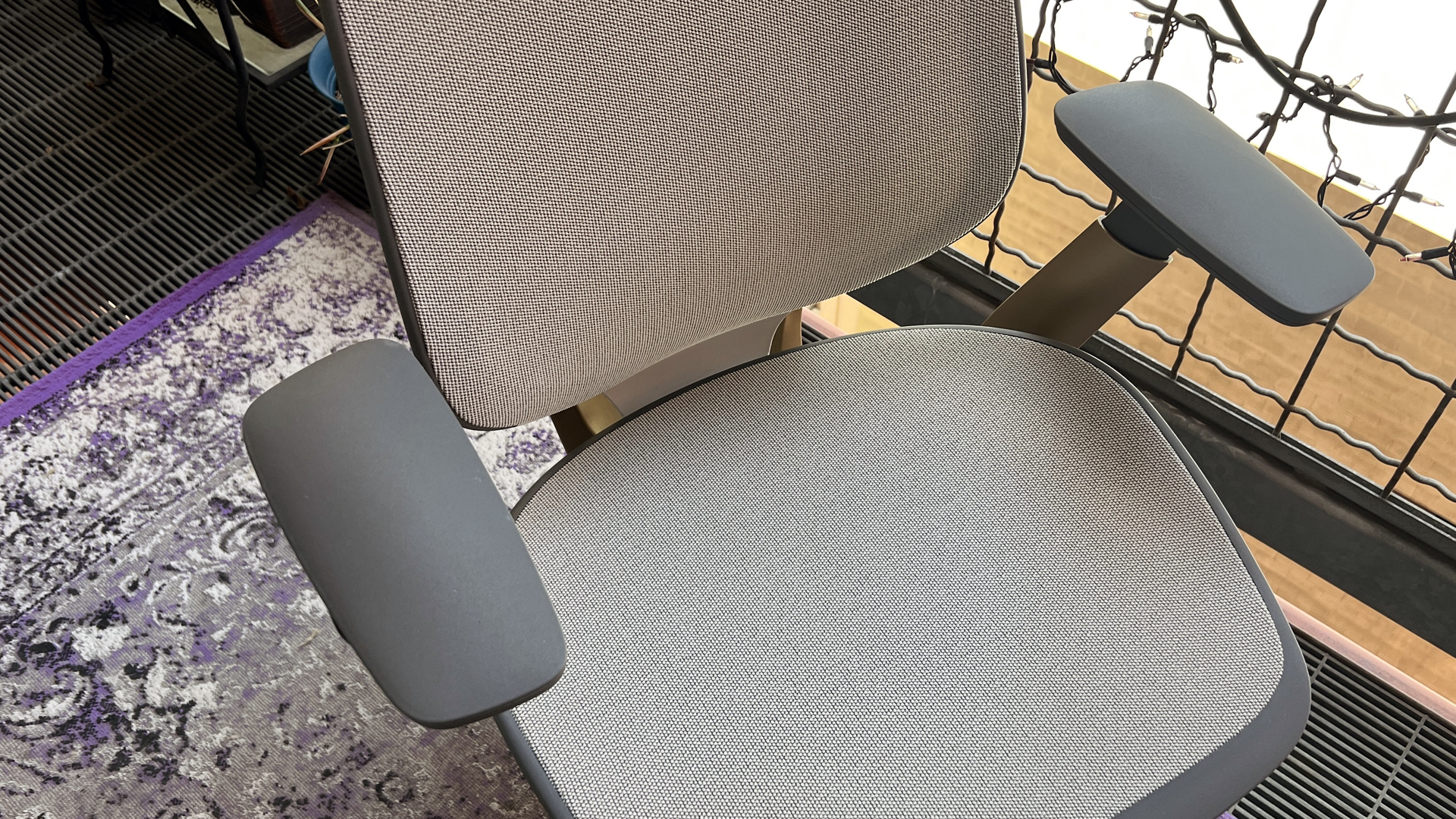
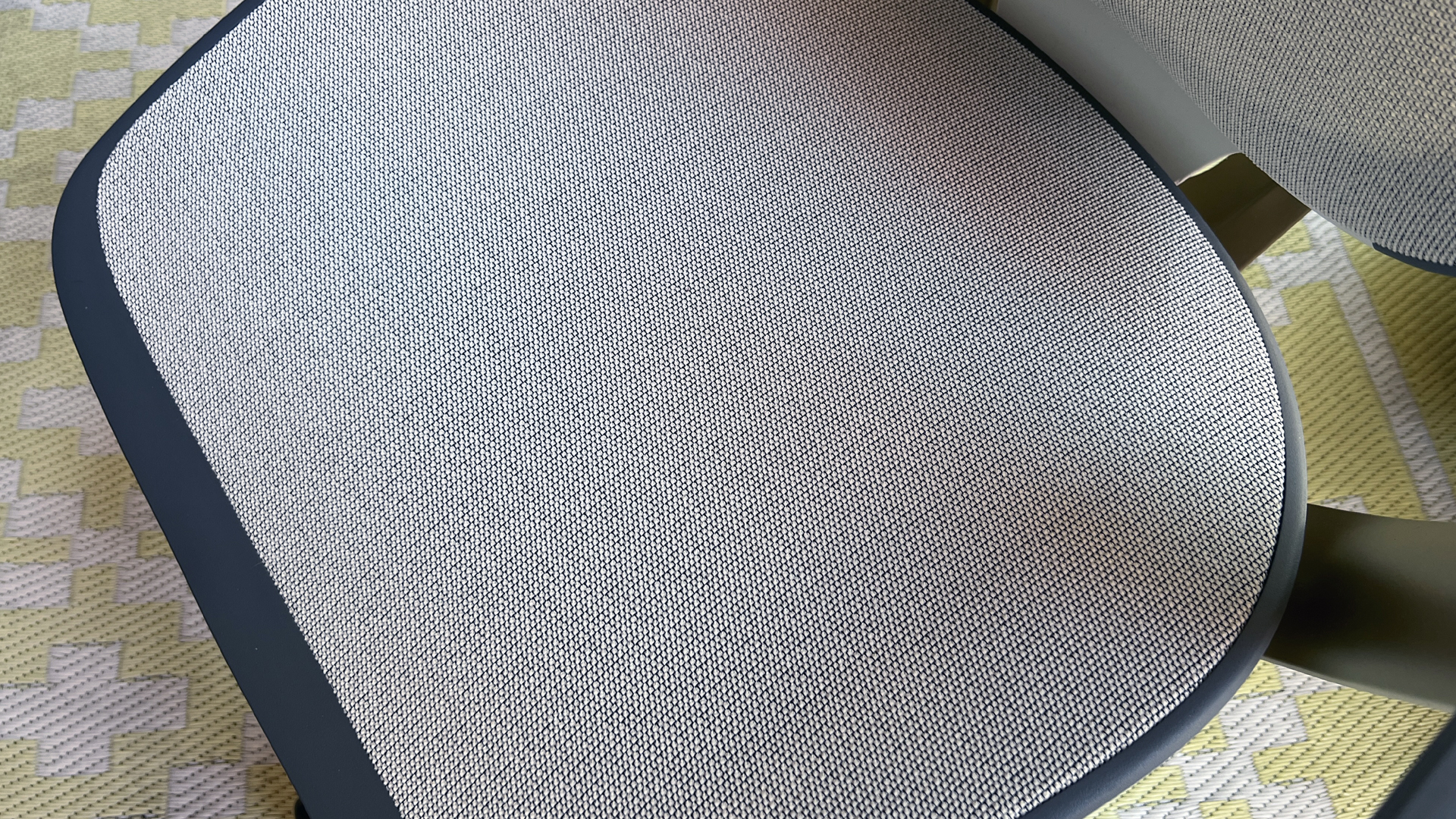
The Karman has a "patented hybrid seat," which is a combination of suspension mesh and padding — the mesh rests on top of a padded cushion. This offers more support throughout the seat than you'll find in an all-mesh chair, such as the Asus ROG Destrier, while still giving you the breathability and durability of a mesh seat. The chair's frame is made of a lightweight, slightly-flexible plastic that Steelcase says is designed to eliminate the hard edges and uncomfortable pressure points often found in all-mesh chairs.
Well. While the frame is definitely softer and more flexible than the frames of other all-mesh chairs I've used — namely, my ride-or-die Aeron — it doesn't completely eliminate the pressure you'll feel if you're pressed up against the edges. The seat's point-of-contact area measures 20 inches (50.8cm) wide by 16.3 inches (41.4cm) deep, but the actual edge-to-edge mesh width is 19.4 inches (49.28cm) and the edge-to-edge mesh depth is about 16.8 inches (42.67cm). I like to sit in chairs with my legs crossed, and while the Karman's width wasn't an issue for me, I did feel the frame against the front of my legs when I sat like this.
Interestingly, I don't have this same issue with the Aeron (Size B), which has a similar seat depth of 16.75 inches (42.55cm) and a slightly larger edge-to-edge mesh depth measurement of 17.25 inches (43.82cm). This is because the Karman's frame can be felt more prominently under the mesh (specifically, the front part of the frame — I didn't have any issues with the sides). Anyway, this was a very minor issue that was only particularly noticeable to me because I happen to normally sit cross-legged in a very similarly-designed chair, and even then I still found the Karman to be very comfortable.
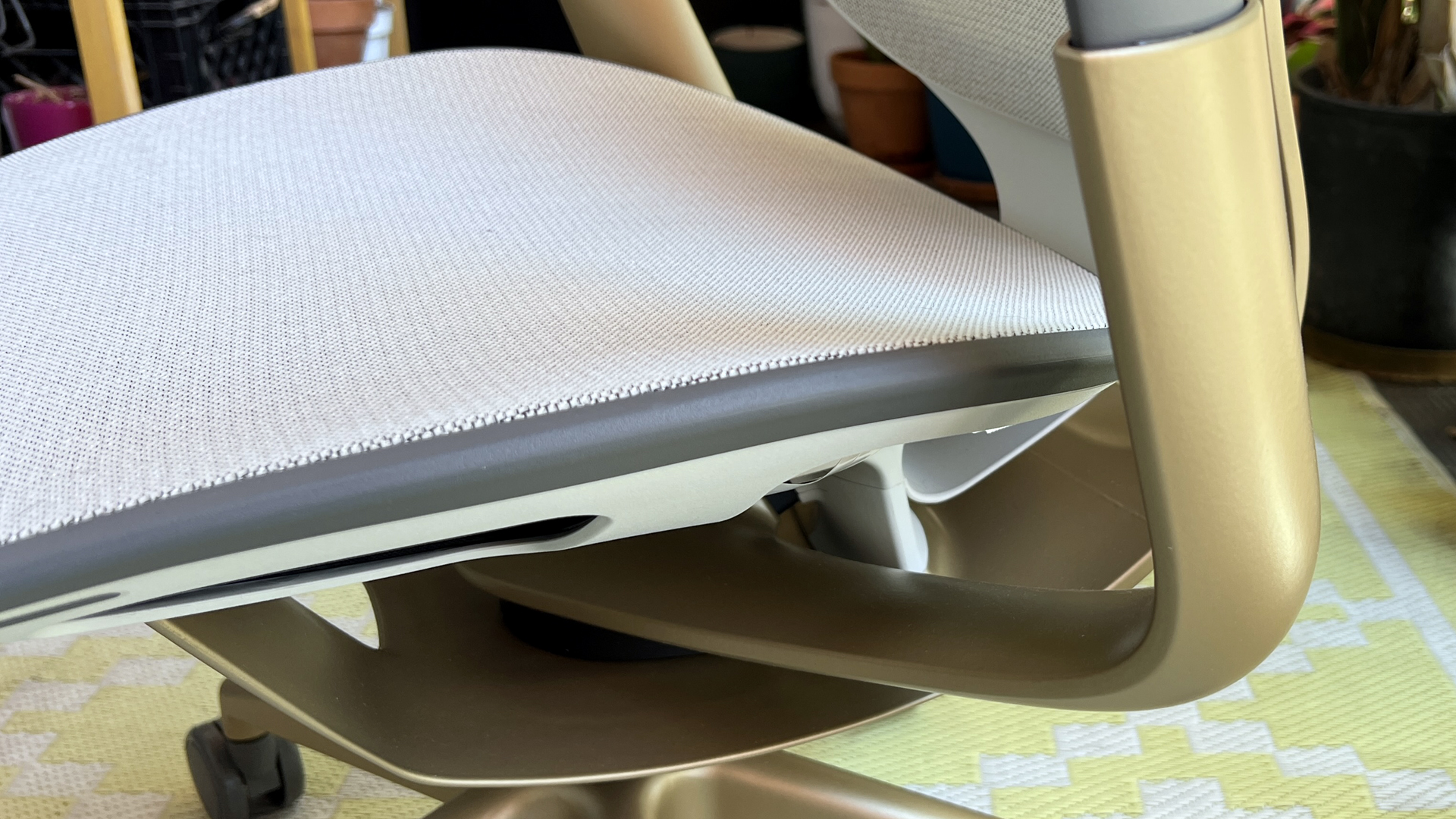
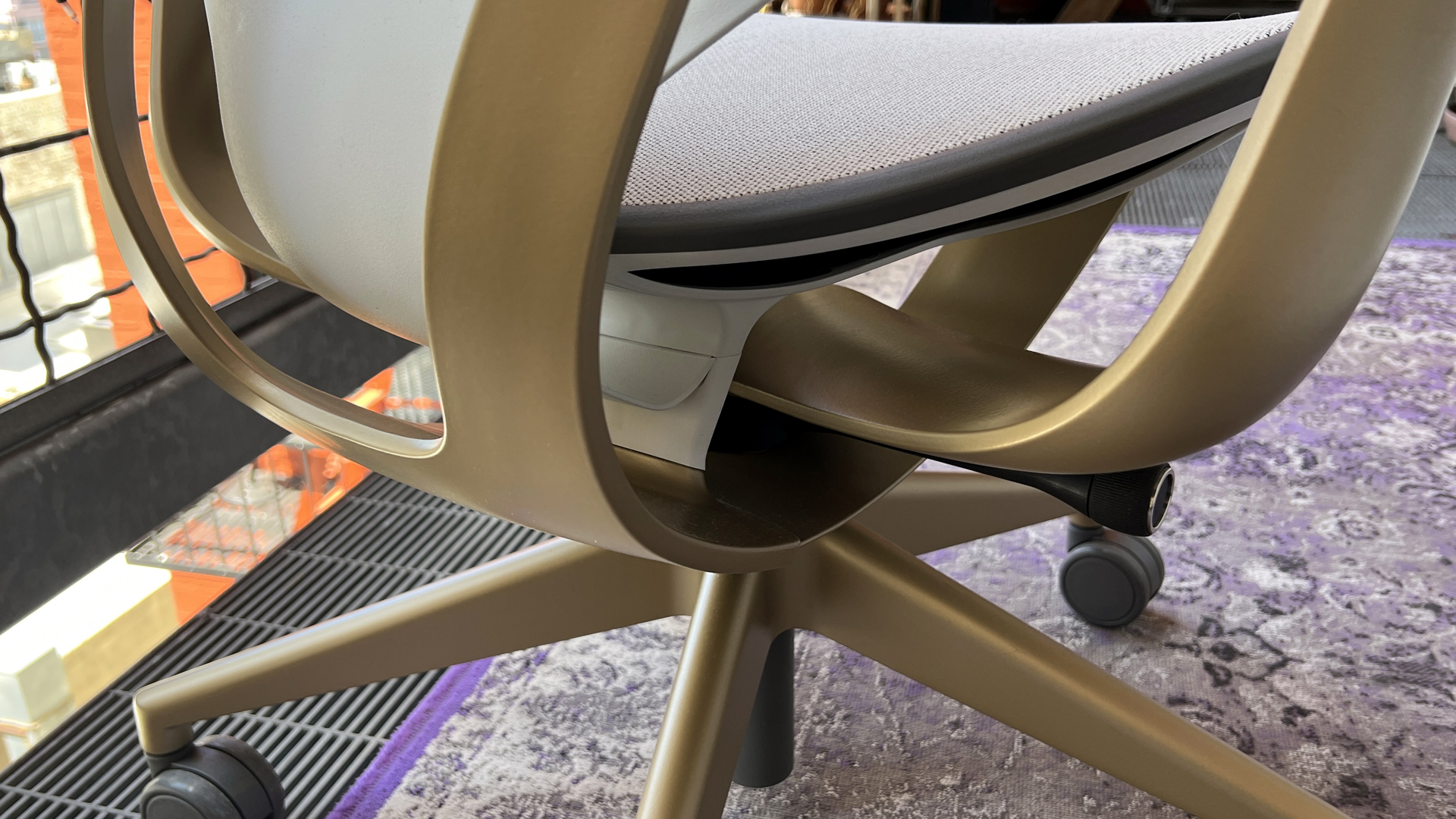
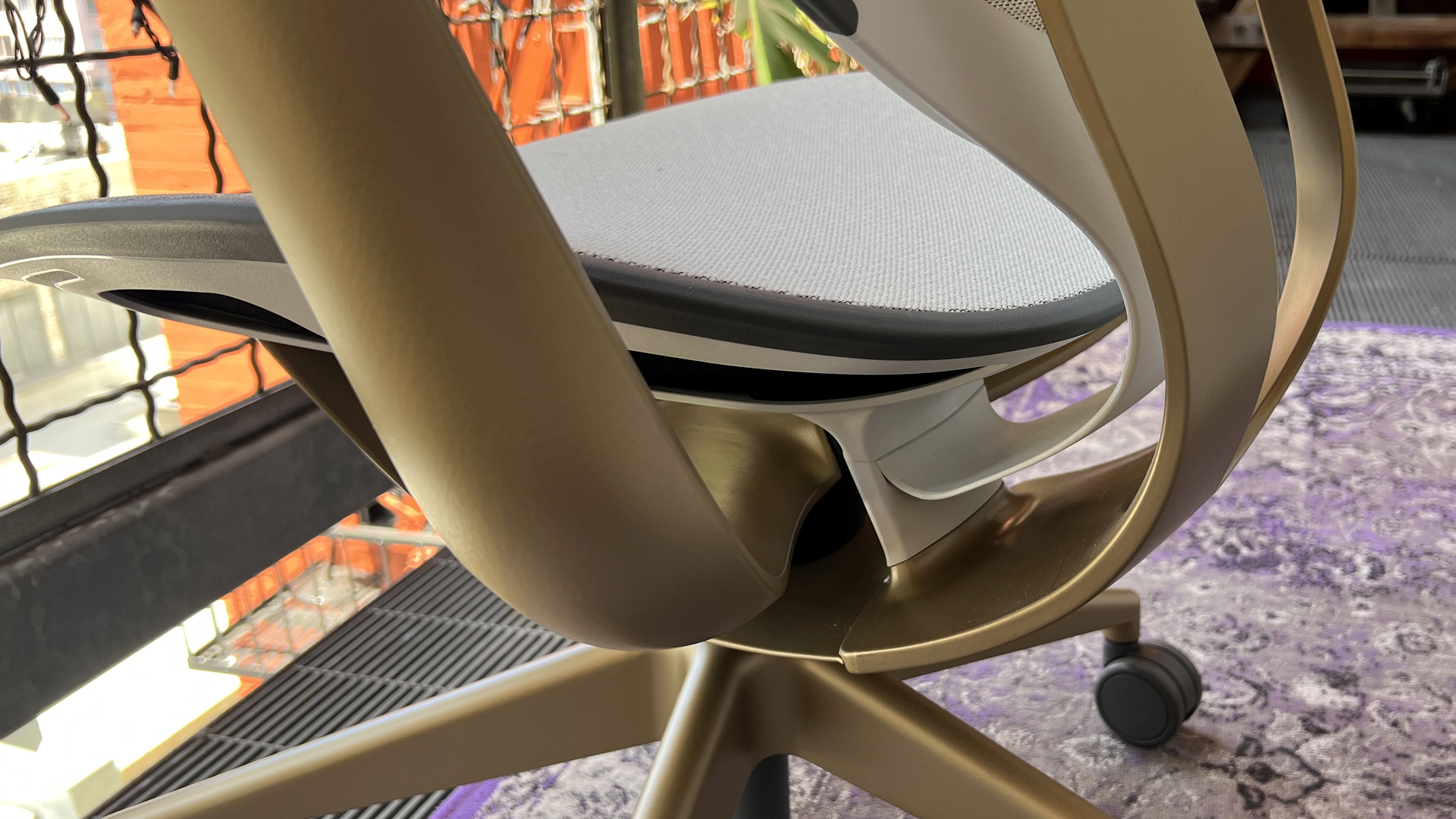
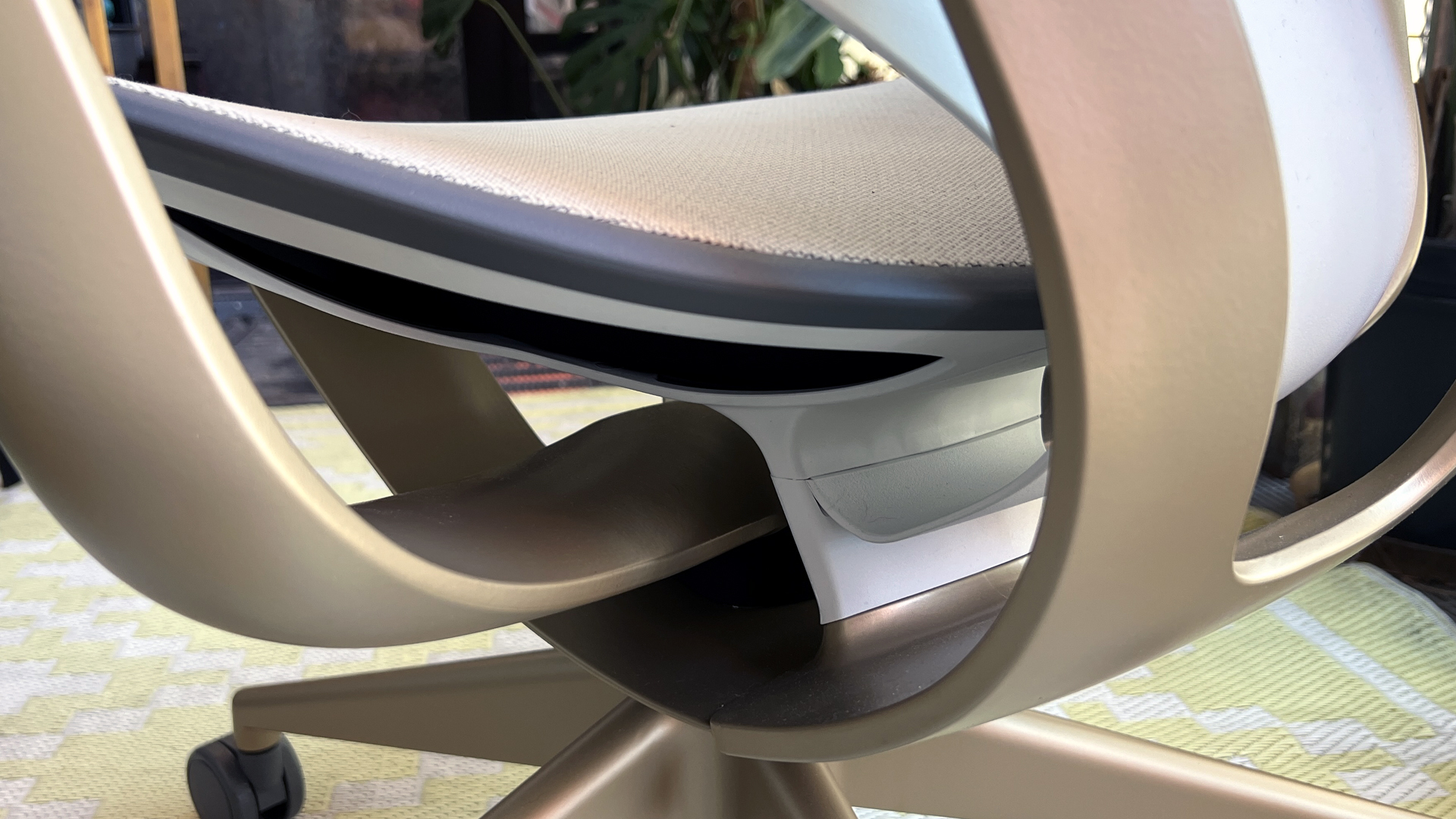
Speaking of the Aeron, the Karman's hybrid seat does raise the question of how difficult it will be to clean. While mesh chairs are generally pretty easy to clean, the Aeron does collect a lot of dust under the seat, and it seems like the Karman would have this same issue — only the padded part of the chair doesn't seem to be very accessible. Not that you should need to access it (cleaning notwithstanding), though — the chair comes with a solid 12-year warranty on both parts and labor.
The Karman sits on a sturdy, five-point aluminum wheelbase painted to match the frame and upholstery. Our review unit came with 2.5-inch plastic wheels for carpet, which is the cheapest option on the Karman — you can also choose wheels for hard floors ($22), hubless wheels for carpet ($86), or hubless wheels for hard floors ($110).
Specs
| Upholstery | Mesh |
| Total Height (with base) | 44.25 inches / 112.4 cm |
| Floor to Seat Height | 15.63 - 20 inches / 39.7 - 50.8 cm |
| Armrest Adjustments | 4D |
| Recline | 96 - 112 degrees |
| Backrest Length | 23.25 inches / 59.06 cm |
| Backrest Width (Shoulder Level) | 17.38 inches / 44.15 cm |
| Seating Area Width (Point of Contact) | 20 inches / 50.8 cm |
| Seating Area Width (total) | 20.13 inches / 51.13 cm |
| Seating Area Depth | 16.3 inches / 41.4 cm |
| Armrest Width | 17.5 - 22.13 inches / 44.45 - 51.13 cm |
| Armrest Height | 23 - 32 inches / 58.42 - 81.28 cm |
| Max Recommended Weight | 350lbs / 158.76kg |
| Weight | 29lbs / 13.15kg |
| Warranty | 12 years |
| Price as Configured | $1,247 |
Comfort and Adjustments
The Karman is “weight-activated,” with a flexible frame that responds to your weight and movement/posture, adjusting support as needed. It’s very comfortable, and you can see the chair's automatic support adjustment happen in real time if you watch different-sized people sit down — the frame definitely seems to move with the person.
The chair has a maximum weight limit of 350 pounds (159kg) and is designed for people who are between 5'2" and 6'4". Both my husband and I are different sizes but solidly within this range (he's 5'11"/190lbs; I'm 5'7"/130lbs), and we both found this chair to be very comfortable without needing to make any manual adjustments.
That's good, perhaps, because the Karman has only one adjustment knob — a combination height paddle and "comfort dial" for adjusting the chair's recline. The knob is located under the seat on the right side of the chair and is relatively easy to reach — though I had to stretch a little to raise and lower the seat. Adjusting the chair's height is pretty straightforward: lift the paddle up to activate the gas lift mechanism, and let your weight (or lack thereof) do the rest. The chair's floor-to-seat height ranges from 15.63 inches (39.7cm) to 20 inches (50.8cm).
The "comfort dial" lets you adjust the chair's recline. The recline is weight-activated, similar to the recline on the Vantum, and has four steps. The first step locks the back in an upright position, while the second step allows you to recline slightly (with a mid-stop). The third step allows for full weight-activated recline with a 20% tension boost, and the fourth step allows for full weight-activated recline and no boost.
I didn't love the first step (I'm not sure who does like being locked in an upright position) or the second step, because I found the mid-stop to be too jarring. Note that "full weight-activated recline" isn't the same as a full 180-degree recline like you'll find on some gaming chairs (such as the Cooler Master Caliber X2 or the Corsair TC200) — the Karman reclines to a maximum of about 22 degrees. My preferred setting for this chair is the third step, though the 20% tension boost isn't all that different from the fourth step (weight-activated only, no boost) and could probably stand to be a little stronger.
The four-step comfort dial might seem pretty limited — and it is — but it's more accommodating than it sounds thanks to the chair's weight-activated frame movement. Still, on a $1000+ chair it would be nice to see separate dials for recline and tension (like on the Vantum). The Karman doesn't offer seat depth adjustment, which isn't something I normally need or look for in a chair, but it also only comes in one size. The chair's one-size was able to accommodate my husband and I perfectly, but neither of us are at the edge of the chair's height or weight parameters. If you're close to 5'2" or 6'4", double-check that the chair's 16.3-inch seat depth will work for you.
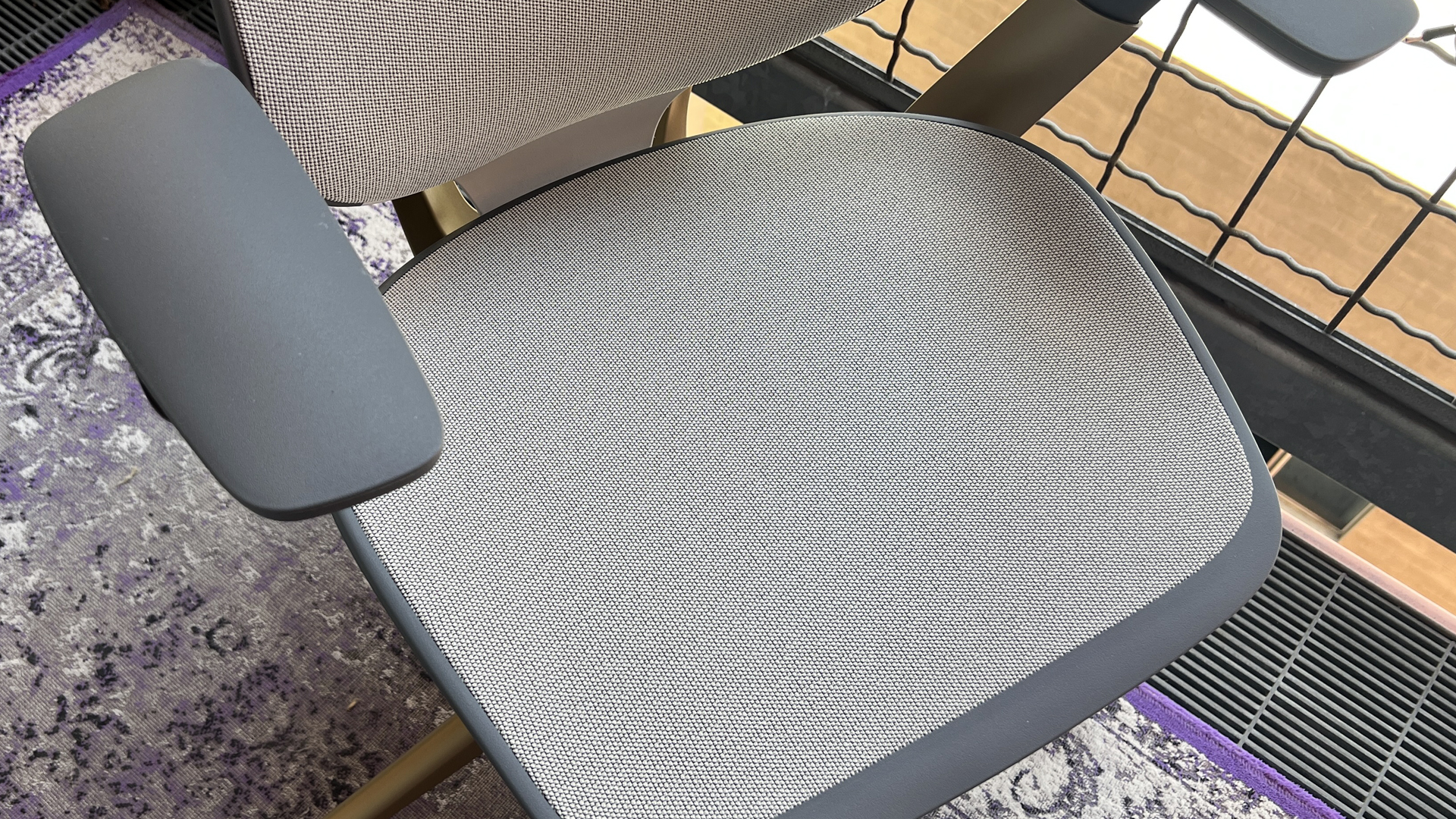
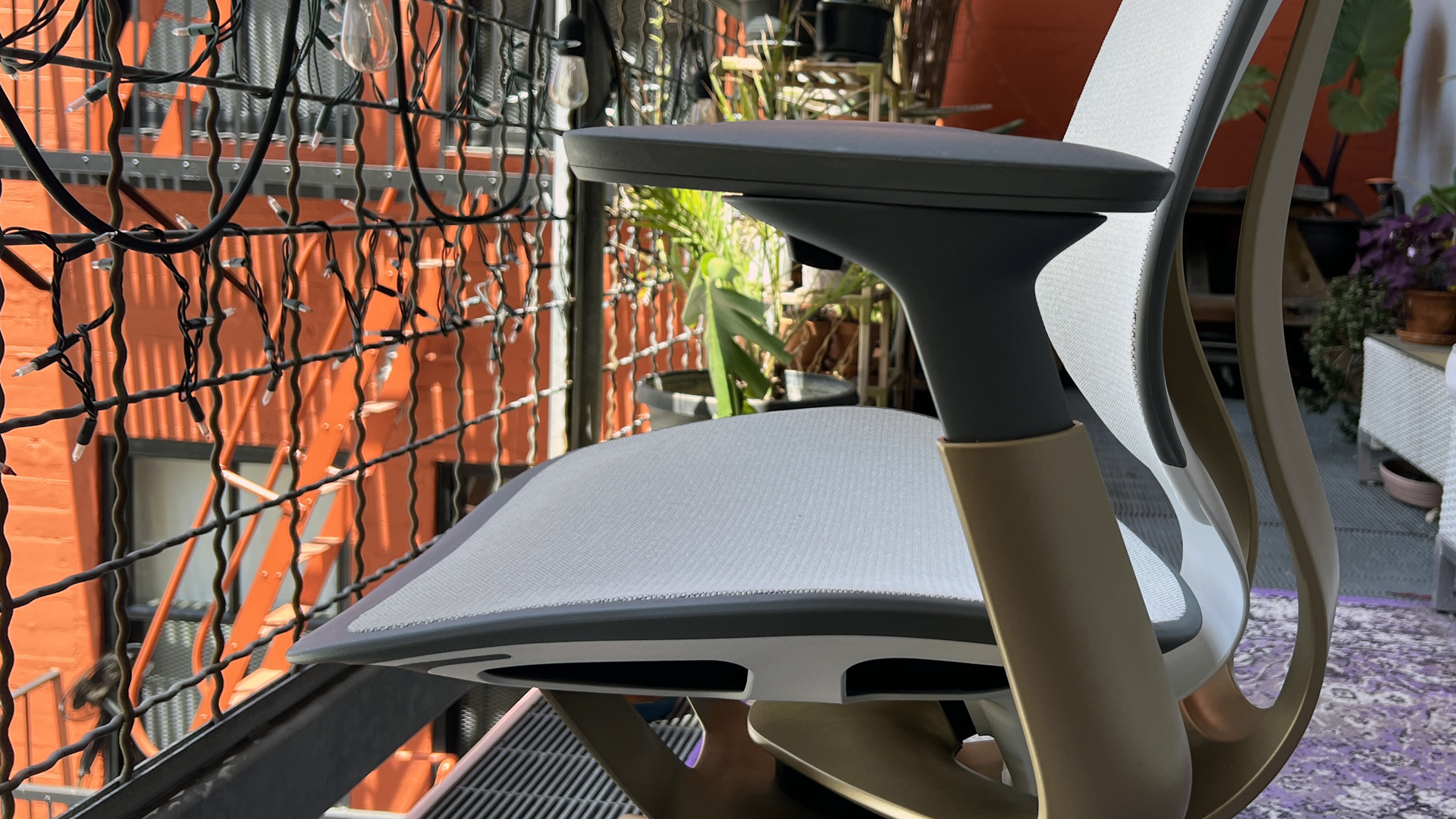
The Karman has fixed-width "4D" armrests, with slightly-padded tops that move forward/back, left/right, and pivot diagonally. Under each armrest is a button that lets you move the armrests up and down — from a minimum floor-to-armrest height of 23 inches (58.42cm) to 32 inches (81.28cm). The armrests are fixed to the chair's base and cannot be manually positioned closer to (or further from) the seat (a feature found on many racing-style chairs, such as the Secretlab Titan Evo 2022). They don't lock into position (except for height), but they're not as trigger-happy as the 4D armrests you'll find on many gaming chairs — they move easily with a slight push, but they don't fly around whenever you accidentally graze them with your elbow.
The Karman's armrests are a little lackluster compared to the rest of the chair, but I've never found myself particularly impressed with any chair's armrests in terms of pure visual appeal and comfort — I'm mostly interested in how easily they can be moved out of the way for various purposes. These armrests can't be moved completely out of the way as they're fixed width and the minimum height level is still fairly high (about 7.5 inches / 19.05cm from the seat), but you can get the chair without armrests (-$226). And if you want armrests but you don't need them to move in all directions, you can get the chair with height-adjustable-only arm rests (-$44).
Bottom Line
Steelcase's Karman is an excellent task chair that's very comfortable and well-built (not to mention, impressively lightweight), and is stylish enough to fit into any gaming space or home office. I'll admit I'm a little biased, but the Karman is definitely one of the best picks in its category — even if you don't share my particular affinity for lightweight all-mesh task chairs. Its weight-activated frame is impressively engineered, and this is a very good option if you're looking for a chair that will be shared by multiple people.
If you're the kind of person who likes to fine-tune their seating with myriad adjustments, however, the Karman's adjustment options are (intentionally) limited. Don't get me wrong, the Karman's weight-activated adjustability is very good, and it may be perfect for you — but if you know you're picky, it's worth checking out this chair in person before dropping $1000+, because there's not much you can do if the chair doesn't work for you as-is. And if you're looking for a similarly-designed task chair with a slightly more gaming vibe, the Herman Miller x Logitech G Vantum is lightweight, extremely comfortable, and features a similar tilt/recline system and a mesh back, and is cheaper at $795.

Sarah Jacobsson Purewal is a senior editor at Tom's Hardware covering peripherals, software, and custom builds. You can find more of her work in PCWorld, Macworld, TechHive, CNET, Gizmodo, Tom's Guide, PC Gamer, Men's Health, Men's Fitness, SHAPE, Cosmopolitan, and just about everywhere else.
